(完整版)初中英语非谓语动词讲解
- 格式:doc
- 大小:64.01 KB
- 文档页数:7
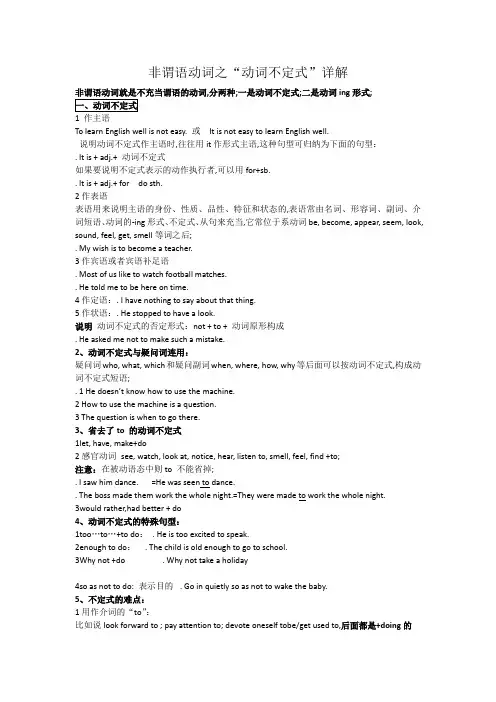
非谓语动词之“动词不定式”详解非谓语动词就是不充当谓语的动词,分两种;一是动词不定式;二是动词ing形式;1 作主语To learn English well is not easy. 或It is not easy to learn English well.说明动词不定式作主语时,往往用it作形式主语,这种句型可归纳为下面的句型:. It is + adj.+ 动词不定式如果要说明不定式表示的动作执行者,可以用for+sb.. It is + adj.+ for do sth.2作表语表语用来说明主语的身份、性质、品性、特征和状态的,表语常由名词、形容词、副词、介词短语、动词的-ing形式、不定式、从句来充当,它常位于系动词be, become, appear, seem, look, sound, feel, get, smell等词之后;. My wish is to become a teacher.3作宾语或者宾语补足语. Most of us like to watch football matches.. He told me to be here on time.4作定语:. I have nothing to say about that thing.5作状语:. He stopped to have a look.说明动词不定式的否定形式:not + to + 动词原形构成. He asked me not to make such a mistake.2、动词不定式与疑问词连用:疑问词who, what, which和疑问副词when, where, how, why等后面可以按动词不定式,构成动词不定式短语;. 1 He doesn’t know how to use the machine.2 How to use the machine is a question.3 The question is when to go there.3、省去了to 的动词不定式1let, have, make+do2感官动词see, watch, look at, notice, hear, listen to, smell, feel, find +to;注意:在被动语态中则to 不能省掉;. I saw him dance. =He was seen to dance.. The boss made them work the whole night.=They were made to work the whole night.3would rather,had better + do4、动词不定式的特殊句型:1too…to…+to do:. He is too excited to speak.2enough to do:. The child is old enough to go to school.3Why not +do . Why not take a holiday4so as not to do: 表示目的. Go in quietly so as not to wake the baby.5、不定式的难点:1用作介词的“to”:比如说look forward to ; pay attention to; devote oneself tobe/get used to,后面都是+doing的的区别动词ing形式分为两种,一是动名词,二是现在分词1.动词的-ing形式用作动名词:动名词是动词的一种非谓语形式,由动词原形加-ing构成,它在句中起名词的作用,可以在句子中用作主语、表语、宾语、宾语补语、状语和定语;1动名词作主语: . Walking is good exercise. 走路是很好的运动2动名词作表语. My favorite sport is swimming. 我最喜欢的运动是游泳;3动名词作宾语: . Jim dislikes eating chocolate. 吉姆不喜欢吃巧克力;. She can’t help crying at a sad movie. 她看了忧伤的电影禁不住要哭;说明有些动词和动词短语只能接动名词;finish, forgive, give up, mind, practise, be good at, do well in, can't help, keep on, feel like, be used to, look forward to, prefer to,;6动名词作定语:动名词可以单独作定语,就像形容词一样;. a smiling face 笑脸swimming pool 游泳池dining-car 餐车2.动词的-ing形式用作现在分词:-ing分词通常用作宾语补足语,表示动作正在发生或者正在进行;这种用法通常用在下列动词中:see, hear, find, smell, watch, find, listen to, look at, notice, observeThere we found him watching TV. 我们发现他在那儿看电视;2I heard someone knocking at the door. 我听见有人在敲门;3.动词ing形式和动名词之间的比较:专练1. Don't forget _________ the letter.A. to sendB. sendC. sendingD. being sent2. The chair looks very old, but in fact it is very comfortable to _________.A. sitB. sit onC. be satD. be sat on3. Is ______ necessary to return the book tomorrowA. thisB. thatC. itD. which4. I'm afraid they would not allow him ________ here.A. to smokeB. smokingC. smokesD. smoke5. Mother told me ________ the water before I drank it.A. boilingB. boiledC. boilD. to boil6. On my way home, I stopped _______ some food.A. buyB. to buyC. buyingD. bought7. Li Yang advised me _________ too much, otherwise I would have been drunk.A. not to drinkB. to drinkC. not drinkingD. drinking8. He ______ two million yuan ______a vase at the auction.A. spent, buyB. cost, buyingC. paid, buyD. spent, buying9. The first thing I want to do is __________.A. visit to himB. to visit himC. visiting himD. visited him10. John was made _______ the car for a week as a punishment.A. to washB. washingC. washD. to be washing11. ________ is one thing, ________ is quite another.A. To say, to doB. Say, doC. Said, didD. To say, do12. I’ll try ________ the same mis takes again.A. to not makeB. not makeC. not to makeD. not making13. It’s too hard ________ it by himself.A. not to doB. to doC. that I doD. doing14. It’s time for sports. Let’s ______bowling, shall weA. go go C. going D. goes15. ‘Mr. Zhou, you’d better______ too much sugar. You are already overweight,’ said the doctor.A. not to eat eat C. not eat D. eat1.If you keep ________fight with him, you may hurt yourself.2.The students are busy ________prepare for the coming exam.3.His duty is ________save the sick people.4.I have nothing ___________ send you.5.They were made ___________ work ten hours a day.6.No one knows what ___________ do next.提高题I. 选择题;1. The doctor came______ our eyes.A. to examineB. for examiningC. as to examineD. examining2. Our teacher always makes us _______ hard.A. to workB. workC. workingD. worked3. _______ our classroom once a week is necessary.A. CleaningB. Clean Cleaned D. To clean4. _______ is our duty ______ good service to customersA. That, to giveB. This, givingC. It, to giveD. It, giving5. It took years______ the highrise.A. for our buildingB. for us in buildingC. to buildD. building6. Their wish is _____ a house of their own.A. to haveB. for havingC. haveD. of having7. The teacher agreed _____ us_____ the test papers home.A. to let, takeB. to let, to takeC. letting, takeD. let, take8. When he saw I was in a hurry, he offered _______ me his bicycle.A. lendingB. lentC. to lendD. in lending9. I don't like_______ people _________about their neighbours.A. hear, talkingB. to hear, talkingC. to hear, to talkD. hearing, talked10. I haven't decided ________A. to take which trainB. which to take a trainC. which train to takeD. which train taken11. You must remember____ me a phone call as soon as you get there.A. givingB. to giveC. gaveD. give12. Professor Brown taught his students______ English, and he learned ______Chinese from them.A. how to speak, speakingB. how to speak, to speakC. how speaking, speakingD. how speak, to speak13. — Sorry, I forgot_________ you that the party wouldn't be held tonight.—That's all right. Mary has told me about it.A. tellingB. I toldC. toldD. to tell14. I wonder_________ him or not.A. if inviteB. whether to invite C to invite D. if to invite15. I hope_________ yourself.A. you to manageB. for you to manageC. you managingD. that you can manage16. — Would you like ________you the way there—It's kind of you. Thank you.A. me showingB. that I showC. me showD. me to show17. The old man said that he'd prefer______alone in the country rather than live with his son in the city.A. livingB. to liveC. that he livesD. for him to live18. I know Alice very well. I have seen her ____ up from childhood.A. growB. grewC. was growingD. to grow19. Since nobody told her______, she came to our help.A. what she didB. to do whatC. what to doD. what she to do20. My aunt showed me _____.A. how to make a dressB. how a dress be madeC. how making a dressD. how a dress made21. After she finished the exercises in the textbook, she tried______ more exercises______ .A. to find, to doB. finding, to doC. to find, she didD. finding, done22. The policeman told Smith ______after drinking.A. to not driveB. not drivingC. not driveD. not to drive23. Tom kept quiet about his mistake_____ lose his job.A. so not as toB. so as not toC. so as to notD. not so as to24. Pat should love ______ little Jim to the theatre this evening.A. to takeB. takingC. that he would takeD. for him to take25. We enjoy _ very much, because it is good for our health.A. runB. runningC. to runD. ran26. — The light in the office is still on.— Oh, I forgot _______.A. turn it offB. to turn it offC. that I turned it offD. that I should turn it off27. They were very tired and stopped_______ under a big tree.A. restingB. to restC. restD. that they would rest28. — Would you mind me the answer to the problem—Not at all.A. that you tell meB. tellingC. to tellD. if telling29. He promised______ a doctor for my son.A. me to getB. that he got meC. me gettingD. me that he got30. Father told the boy ______the dog a few bones after dinner.A. that he gaveB. to giveC. givingD. gave.money for his education, his parents worked hard even after their day's work.A. For gettingB. GetC. So as to getD. In order to get32. I think you are_________ meals yourself.A. enough old to cookB. old enough to cookC. old enough for cookingD. enough old cooking33. The maths problem is_________ difficult_________.A. so, as to work outB. very , to work outC. too, to work outD. quite, worked out34. Last night I was so tired that I fell asleep soon. I didn't hear him in.A. comingB. cameC. to comeD. come35. Have you anything important____ usA. to tellB. tellingC. told usD. you tell36. — Do you know about Captain Ed Mitchell 202—Yes. He was the sixth man _____ on the moon.A. walkingB. walkedC. to walkD. of walking37. It is nice________her__________so.A. for, to sayB. for, sayingC. of, to sayD. of, said38. Isn't it a nice way _____the hard problemA. to solveB. in solvingC. solveD. solving39. You'd better_________ her about her own health now.A. not to tellB. not tellC. to not tellD. to tell not40. What a coincidence Dr. Brown happened_______ the doctor I was looking for.A. he wasB. beingC. to beD. to beingII. 填空题;1. Factories do not let out dirty water____________________ 为了不污染河流.2. Her job is _________________. 照顾医院里患病的孩子3. In the supermarket the college students learned____________________. 如何为顾客服务4. There were so many toys that Judy didn't know____________________. 挑选哪一个.5. The only trouble is_____________________. 如何保护这些电脑6. He will save money _____________________________.为了支付将来的大学费用7. The nurse__________________________________ . 不允许孩子们玩火柴8. This medicine will________________.帮你入睡9. They will be sent_______________到非洲当医疗队员.10. The boy asked his teacher__________________________.让他自己修理冰箱11. The question is__________________. 是否让孩子们自己解决这个问题.12. This telephone is_____________________. 足够小可以放进口袋13. This book will tell you ______________________. 如何使这台电脑储存信息14. I ________________________. 没有回答试卷上的最后一个问题15. It is not easy ______________________________. 一个人戒烟16. You can take a taxi there______ __________________. 而不是步行去17. The underground train is ________________________. 足够快可在20分钟内从我们学校行驶到体育场.18. The lecture hall is __________________.太小容纳不下500个学生19. Julia hurried to school__________________________. 没有吃早餐.20. I told the students__________________________. 不要将罐头和饮料瓶扔进河里21. Thomas ____________________________________. 有许多问题要问老师22. Do you know the saying “_______________________.”活到老学到老23. Jack saw _____________________. 牛跑回来24. Athens ran all the way__________________________________把好消息告诉他的人民.25. He was the first man ___________________________________. 骑骑自行车做环球旅行26. They enjoy____________________________________. 爬山和野营27. As soon as the teacher entered, he asked_____________________________我们停止讲话.28. _____________________ 在一个半小时内做完这份试卷is almost impossible.29. We were happy________________________________. 看到他们回到营地30. Would you mind _______________________________.我在你办公室打电话答案:I.1. A2. B3. D4. C5. C6. A7. A8. C9. B10. C 11. B 12. B 13. D 14. B 15. D 16. D 17. B 18. A19. C 20. A 21.A 22. D 23.B 24. A 25. B 26. B 27. B 28. B 29. A 30. B 31. D32. B 33. C 34. D 35. A 36. C37. C 38. A 39. B 40. CII.1. so as not to pollute the rivers2. to take care of the sick children in the hospital3. how to serve customers4. which to choose5. how to protect these computers6. so as to pay the college expenses in the future7. didn't allow the children to play with matches8. help you to go to sleep9. to work in Africa as members of a medical team10. to let him repair the fridge himself11. whether or not to let the children solve the problem themselves12. small enough to fit into a pocket13. how to make this computer store information14. failed to answer the last question in the test paper15. for one to give up smoking16. instead of walking17. fast enough to move from our school to the stadium in twenty minutes18. too small to hold five hundred students19. without having breakfast20. not to throw the cans and drinks bottles into the river21. had many questions to ask his teacher22. One is never too old to learn23. the bull run back24. to tell his people the good news25. to travel around the world on his bicycle26. climbing mountains and going on a camping trip27. us to stop talking28. To finish doing the test paper in one and a half hours29. to see them return to the campsite30. my making a telephone call in your office。
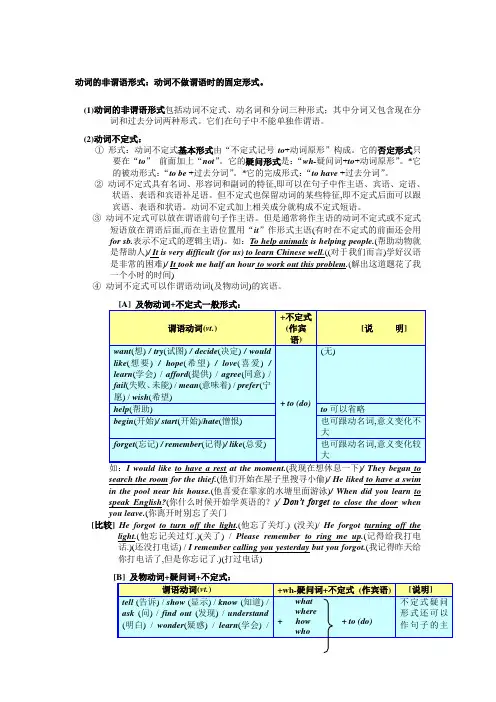
动词的非谓语形式:动词不做谓语时的固定形式。
(1)动词的非谓语形式包括动词不定式、动名词和分词三种形式;其中分词又包含现在分词和过去分词两种形式。
它们在句子中不能单独作谓语。
(2)动词不定式:①形式:动词不定式基本形式由“不定式记号to+动词原形”构成。
它的否定形式只要在“to”前面加上“not”。
它的疑问形式是:“wh-疑问词+to+动词原形”。
*它的被动形式:“to be +过去分词”。
*它的完成形式:“to have +过去分词”。
②动词不定式具有名词、形容词和副词的特征,即可以在句子中作主语、宾语、定语、状语、表语和宾语补足语。
但不定式也保留动词的某些特征,即不定式后面可以跟宾语、表语和状语。
动词不定式加上相关成分就构成不定式短语。
③动词不定式可以放在谓语前句子作主语。
但是通常将作主语的动词不定式或不定式短语放在谓语后面,而在主语位置用“it”作形式主语(有时在不定式的前面还会用for sb.表示不定式的逻辑主语)。
如:To help animals is helping people.(帮助动物就是帮助人)/ It is very difficult (for us) to learn Chinese well.((对于我们而言)学好汉语是非常的困难)/ It took me half an hour to work out this problem.(解出这道题花了我一个小时的时间)④动词不定式可以作谓语动词(及物动词)的宾语。
to have a rest began to search the room for the thief.(他们开始在屋子里搜寻小偷)/ He liked to have a swimin the pool near his house.(他喜爱在靠家的水塘里面游泳)/ When did you learn tospeak English?(你什么时候开始学英语的?)/ Don’t forget to close the door whenyou leave.(你离开时别忘了关门[比较] He forgot to turn off the light.(他忘了关灯.) (没关)/ He forgot turning off the light.(他忘记关过灯.)(关了) /Please remember to ring me up.(记得给我打电话.)(还没打电话) / I remember calling you yesterday but you forgot.(我记得昨天给你打电话了,但是你忘记了.)(打过电话)He does not know which one to take./ Tell me how to get to the station.(告诉我怎么样去火车站)/ She asked me what to do for today’s homework.(她问我今天家庭作业做什么)/ Can you teach me how to search the internet?(你能教我怎样上网吗?)[C] 不定式作宾语而后面又有宾语补足语时,通常用it代替作形式宾语,而不定式则后置。
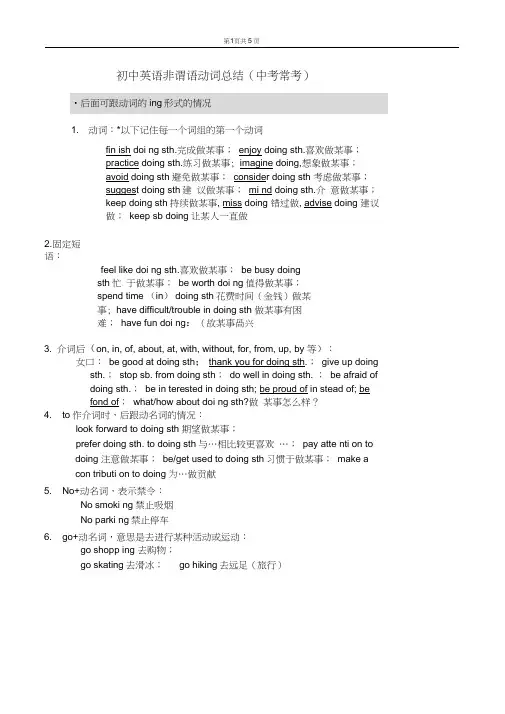
初中英语非谓语动词总结(中考常考)1. 动词:*以下记住每一个词组的第一个动词fin ish doi ng sth.完成做某事;enjoy doing sth.喜欢做某事;practice doing sth.练习做某事; imagine doing,想象做某事;avoid doing sth避免做某事;consider doing sth 考虑做某事;suggest doing sth建议做某事;mi nd doing sth.介意做某事;keep doing sth持续做某事, miss doing 错过做, advise doing 建议做;keep sb doing让某人一直做2.固定短语:feel like doi ng sth.喜欢做某事;be busy doingsth忙于做某事;be worth doi ng值得做某事;spend time (in) doing sth花费时间(金钱)做某事; have difficult/trouble in doing sth 做某事有困难;have fun doi ng:(故某事咼兴3. 介词后(on, in, of, about, at, with, without, for, from, up, by 等):女口:be good at doing sth; thank you for doing sth.;give up doing sth.;stop sb. from doing sth;do well in doing sth. ;be afraid ofdoing sth.;be in terested in doing sth; be proud of in stead of; befond of;what/how about doi ng sth?做某事怎么样?4. to作介词时,后跟动名词的情况:look forward to doing sth 期望做某事;prefer doing sth. to doing sth与…相比较更喜欢…;pay atte nti on todoing 注意做某事;be/get used to doing sth习惯于做某事;make acon tributi on to doing 为…做贡献5. No+动名词,表示禁令:No smoki ng禁止吸烟No parki ng禁止停车6. go+动名词,意思是去进行某种活动或运动:go shopp ing 去购物;go skating去滑冰;go hiking去远足(旅行)7. do some/the+动名词,指进行某种活动:do some clea ning 搞卫生;do some washing 洗衣服;1. 动词:agree (sb)to do 同意去做;afford to do 买得起;decide to do决定去做某事;hope to do希望去做;wish (sb)to do 希望去做;fail to do做某事失败去;planto do打算去做;prete nd to do假装去做;refuse to do拒绝去做;would like to do想要去做;want (sb)to do想要去做某事;lear n to do 学做;prefer to do sth.喜欢(爱)做某事;sb. seem to do sth好像做某事;wan t/would like to do sth.想做.............................. ;used to do sth.过去常做某事2句型:⑴动词:allow sb. to do sth.允许某人去做某事(区分allow doi ng sth)ask sb. (not) to do sth.叫某人做事某事(叫某人不要去做某事)tell sb. (not) to do sth .叫某人去(不要)做某事follow sb. to do sth.跟随某人去做某事get sb. to do sth.让某人去做某事warn sb. (not)to do sth.警告某人做某事(或不要做某事)encourage sb to de鼓励某人做、expect sb to do期待某人做in vite sb to do邀请某人做、teach sb to do教会某人做advise sb to do建议某人做(区分下advise/suggest doing sth(2) Be+adj (情感类的形容词)+to dobe amazed to do sth.对做某事感至『惊讶be afraid to do sth.害怕做某事be excited todo sth.对做 ............... 感到兴奋be frightened to do sth.害怕去做某事be glad / happy to do sth.高兴去做某事be / getready to do sth准备做某事be sorry to do sth.对做某事感到抱歉be surprised to dosth.对做某事感到惊奇(3)动词不定式在句中作定语时一般都要放在所修饰名词或代词的后面女口: 1、a chance to do sth 做某事的一个机会2、 t he way to do sth 做某事的办法3、 t he best time to do sth 做某事的最佳时间4、 s omething to eat 一些吃的东西5、 s omething to drink —些喝的东西6、 a lot of work to do 许多要做的工作如:get / have a chance to do sth.得到一个做某事的机会(4) It '形容词(adj.)+for (of ) +sb +to do sth 对某人来说做某事怎么样分析:形容词(adj.)修饰文中的事情既to do sth 时,人前的介词用for ;但是如果形容词(adj.)修饰文中的人既 sb 时,人前面的介词用 of.女口:①It ' s hard for me to learn English we 句子 hard 是修饰动词不定式 to learn englishwell ,意为学好英语难,所以用的介词是 for sb.)②It ' s kind of you to help m (句中kind “善良的”修饰you (人)意为你善良,所以介 词用of sb.)(5)其它的常考情况:It takes sb. some time/mo ney to do sth 花费某人多长时间做某事(常考)It ' s best for sb. to do s 对某人来说做某事是最好的It ' s time for sb. to do s 是某人做某事的时候了can ' t wait to do sth 迫不急待地去做某事prefer to do sth. rather than do sth.宁愿 ........ 而不愿 .... (常考注意: basketball to 90^ fishing . 禾口 I prefer tp play basketball rather than go fishing. play basketball than go fishing. 这三 句是同义句) sth. is hard/difficult/easy to do 做好某事很难 /容易take turns to do sth.轮流做 ...There is no time (for sb. ) to do sth.对(某人来说)没时间做某事了There is no n eed (for sb.) to do sth.对某人来说没必要做某事 try/do one ' s best to do 尽力去做某事1、后加不定式或动名词意思相近的动词。
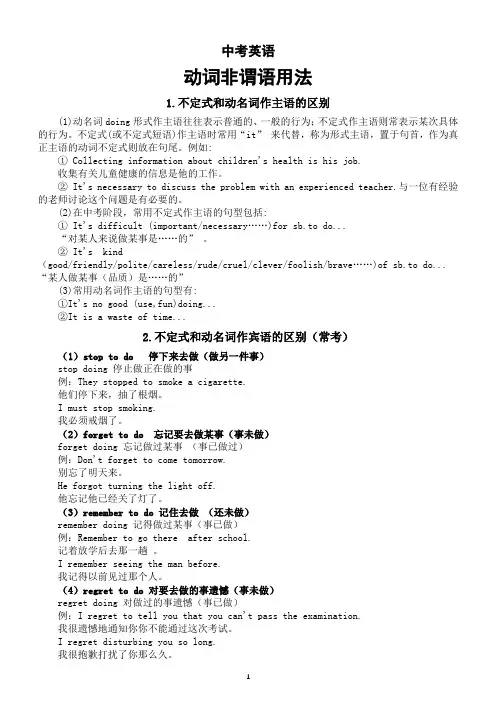
中考英语动词非谓语用法1.不定式和动名词作主语的区别(1)动名词doing形式作主语往往表示普通的、一般的行为;不定式作主语则常表示某次具体的行为。
不定式(或不定式短语)作主语时常用“it”来代替,称为形式主语,置于句首,作为真正主语的动词不定式则放在句尾。
例如:① Collecting information about children's health is his job.收集有关儿童健康的信息是他的工作。
② It's necessary to discuss the problem with an experienced teacher.与一位有经验的老师讨论这个问题是有必要的。
(2)在中考阶段,常用不定式作主语的句型包括:① It's difficult (important/necessary……)for sb.to do...“对某人来说做某事是……的”。
② It's kind(good/friendly/polite/careless/rude/cruel/clever/foolish/brave……)of sb.to do... “某人做某事(品质)是……的”(3)常用动名词作主语的句型有:①It's no good (use,fun)doing...②It is a waste of time...2.不定式和动名词作宾语的区别(常考)(1)stop to do 停下来去做(做另一件事)stop doing 停止做正在做的事例:They stopped to smoke a cigarette.他们停下来,抽了根烟。
I must stop smoking.我必须戒烟了。
(2)forget to do 忘记要去做某事(事未做)forget doing 忘记做过某事(事已做过)例:Don't forget to come tomorrow.别忘了明天来。
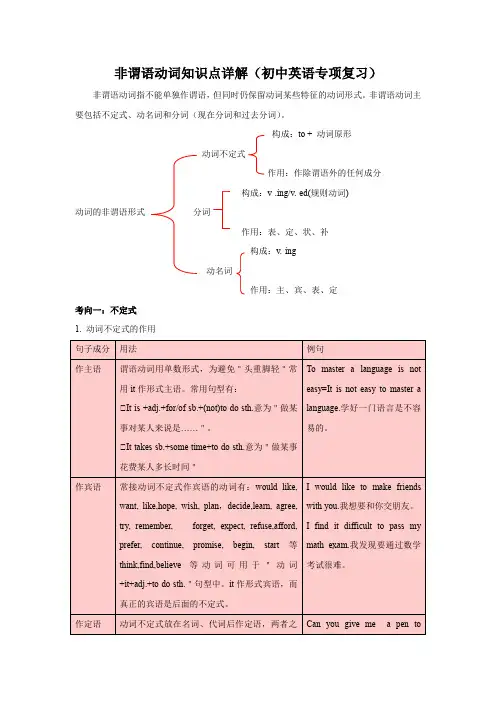

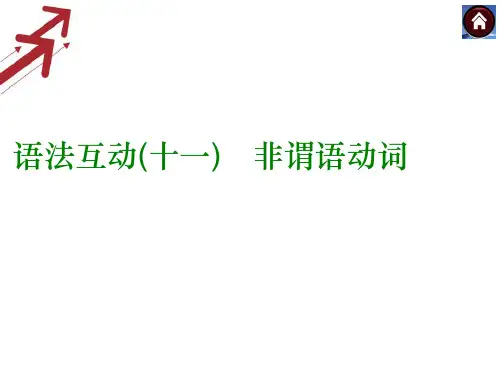
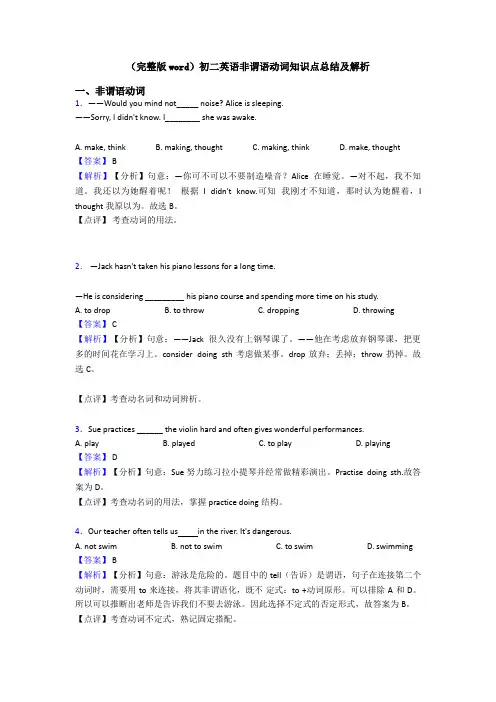
(完整版word)初二英语非谓语动词知识点总结及解析一、非谓语动词1.——Would you mind not_____ noise? Alice is sleeping.——Sorry, I didn't know. I________ she was awake.A. make, thinkB. making, thoughtC. making, thinkD. make, thought【答案】 B【解析】【分析】句意:—你可不可以不要制造噪音?Alice在睡觉。
—对不起,我不知道。
我还以为她醒着呢!根据I didn't know.可知我刚才不知道,那时认为她醒着,I thought我原以为。
故选B。
【点评】考查动词的用法。
2.—Jack hasn't taken his piano lessons for a long time.—He is considering _________ his piano course and spending more time on his study.A. to dropB. to throwC. droppingD. throwing【答案】 C【解析】【分析】句意:——Jack很久没有上钢琴课了。
——他在考虑放弃钢琴课,把更多的时间花在学习上。
consider doing sth考虑做某事。
drop放弃;丢掉;throw扔掉。
故选C。
【点评】考查动名词和动词辨析。
3.Sue practices ______ the violin hard and often gives wonderful performances.A. playB. playedC. to playD. playing【答案】 D【解析】【分析】句意:Sue努力练习拉小提琴并经常做精彩演出。
Practise doing sth.故答案为D。
【点评】考查动名词的用法,掌握practice doing结构。
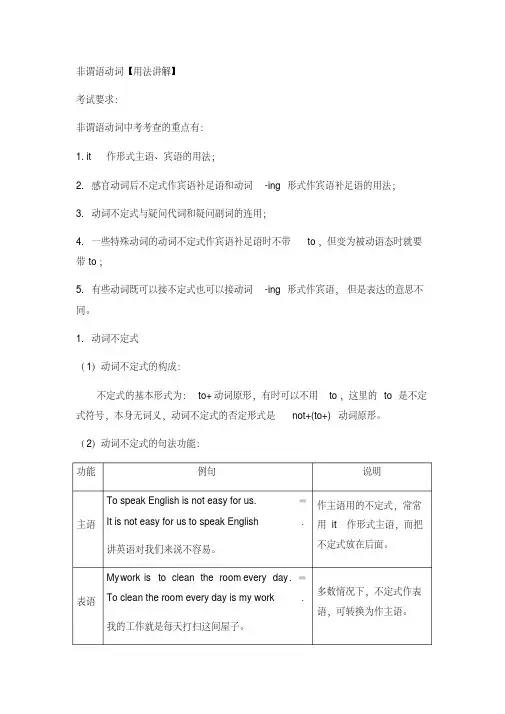
非谓语动词【用法讲解】考试要求:非谓语动词中考考查的重点有:1. it 作形式主语、宾语的用法;2. 感官动词后不定式作宾语补足语和动词-ing形式作宾语补足语的用法;3. 动词不定式与疑问代词和疑问副词的连用;4. 一些特殊动词的动词不定式作宾语补足语时不带to,但变为被动语态时就要带to;
5. 有些动词既可以接不定式也可以接动词-ing形式作宾语,但是表达的意思不同。
1. 动词不定式(1)动词不定式的构成:不定式的基本形式为:to+动词原形,有时可以不用to,这里的to是不定式符号,本身无词义,动词不定式的否定形式是not+(to+)动词原形。
(2)动词不定式的句法功能:功能例句说明
主语To speak English is not easy for us. =It is not easy for us to speak English.讲英语对我们来说不容易。作主语用的不定式,常常用it作形式主语,而把不定式放在后面。
表语My work is to clean the room every day.=To clean the room every day is my work.
我的工作就是每天打扫这间屋子。
多数情况下,不定式作表
语,可转换为作主语。宾语—What sports does he like to play? 他喜欢做什么运动? —He likes to play basketball.他喜欢打篮球。只能作某些动词的宾语,一般不作介词的宾语。
宾补My mother made me play the piano all the time.我妈妈让我一直弹钢琴。在make,let,see,hear,watch等使役、感官动词后,不定式省略to。
定语Have you got anything to say?你有要说的吗? 不定式作定语,要放在所修饰词的后面。
状语I’m sorry to trouble you.(表原因) 很抱歉,给你添麻烦了。I went to the library to study English.(表目的)

1 非谓语动词之“动词不定式”详解 非谓语动词就是不充当谓语的动词,分两种。一是动词不定式。二是动词ing形式。 一、动词不定式 1) 作主语 To learn English well is not easy. 或 It is not easy to learn English well. [说明]动词不定式作主语时,往往用it作形式主语,这种句型可归纳为下面的句型: e.g. It is + adj.+ 动词不定式 如果要说明不定式表示的动作执行者,可以用for+sb. e.g. It is + adj.+ for sb.to do sth. 2)作表语 (表语用来说明主语的身份、性质、品性、特征和状态的,表语常由名词、形容词、副词、介词短语、动词的-ing形式、不定式、从句来充当,它常位于系动词(be, become, appear, seem, look, sound, feel, get, smell等词)之后。) e.g. My wish is to become a teacher. 3)作宾语或者宾语补足语 e.g. Most of us like to watch football matches. e.g. He told me to be here on time. 4)作定语:e.g. I have nothing to say about that thing. 5)作状语:e.g. He stopped to have a look. [说明] 动词不定式的否定形式:not + to + 动词原形构成 e.g. He asked me not to make such a mistake. 2、动词不定式与疑问词连用: 疑问词who, what, which和疑问副词when, where, how, why等后面可以按动词不定式,构成动词不定式短语。 e.g. (1) He doesn’t know how to use the machine. (2) How to use the machine is a question. (3) The question is when to go there. 3、省去了to 的动词不定式 1)let, have, make+do 2)感官动词 see, watch, look at, notice, hear, listen to, smell, feel, find +to。 注意:在被动语态中则to 不能省掉。 e.g. I saw him dance. =He was seen to dance. e.g. The boss made them work the whole night.=They were made to work the whole night. 3)would rather,had better + do 4、动词不定式的特殊句型: 1)too…to…+to do: e.g. He is too excited to speak. 2)enough to do: e.g. The child is old enough to go to school. 3)Why not +do e.g. Why not take a holiday? 4)so as (not) to do: 表示目的 e.g. Go in quietly so as not to wake the baby. 5、不定式的难点: 1)用作介词的“to”: 比如说look forward to ; pay attention to; devote oneself tobe/get used to,后面都是+doing的! 2)It's for sb.和 It's of sb.的区别 2
二、动词ing形式: 动词ing形式分为两种,一是动名词,二是现在分词 1.动词的-ing形式用作动名词: 动名词是动词的一种非谓语形式,由动词原形加-ing构成,它在句中起名词的作用,可以在句子中用作主语、表语、宾语、宾语补语、状语和定语。 1)动名词作主语: e.g. Walking is good exercise. 走路是很好的运动 2)动名词作表语 e.g. My favorite sport is swimming. 我最喜欢的运动是游泳。 3)动名词作宾语: e.g. Jim dislikes eating chocolate. 吉姆不喜欢吃巧克力。 e.g. She can’t help crying at a sad movie. 她看了忧伤的电影禁不住要哭。 [说明] 有些动词和动词短语只能接动名词。 e.g.admit, finish, forgive, give up, mind, practise, be good at, do well in, can't help, keep on, feel like, be used to, look forward to, prefer to,。 6)动名词作定语:动名词可以单独作定语,就像形容词一样。 e.g. a smiling face 笑脸 swimming pool 游泳池 dining-car 餐车 2.动词的-ing形式用作现在分词: -ing分词通常用作宾语补足语,表示动作正在发生或者正在进行。这种用法通常用在下列动词中:see, hear, find, smell, watch, find, listen to, look at, notice, observe e.g.1)There we found him watching TV. 我们发现他在那儿看电视。 2)I heard someone knocking at the door. 我听见有人在敲门。
3.动词ing形式和动名词之间的比较: 下面这些动词,后面接不定式或动名词意思都是一样的: begin to do begin doing continue to do continue doing start to do start doing 下面这些动词,后面接不定式或动名词意思是不一样的: stop to do stop doing forget to do forget doing remember to do remember doing try to do try doing
go on to do go on doing be afraid to do be afraid doing
【专练】 1. Don't forget _________ the letter. A. to send B. send C. sending D. being sent 2. The chair looks very old, but in fact it is very comfortable to _________. A. sit B. sit on C. be sat D. be sat on 3. Is ______ necessary to return the book tomorrow? A. this B. that C. it D. which 4. I'm afraid they would not allow him ________ here. A. to smoke B. smoking C. smokes D. smoke 5. Mother told me ________ the water before I drank it. A. boiling B. boiled C. boil D. to boil 3
6. On my way home, I stopped _______ some food. A. buy B. to buy C. buying D. bought 7. Li Yang advised me _________ too much, otherwise I would have been drunk. A. not to drink B. to drink C. not drinking D. drinking 8. He ______ two million yuan ______a vase at the auction. A. spent, buy B. cost, buying C. paid, buy D. spent, buying 9. The first thing I want to do is __________. A. visit to him B. to visit him C. visiting him D. visited him 10. John was made _______ the car for a week as a punishment. A. to wash B. washing C. wash D. to be washing 11. ________ is one thing, ________ is quite another. A. To say, to do B. Say, do C. Said, did D. To say, do 12. I’ll try ________ the same mistakes again. A. to not make B. not make C. not to make D. not making 13. It’s too hard ________ it by himself. A. not to do B. to do C. that I do D. doing 14. It’s time for sports. Let’s ______bowling, shall we? A. go B.to go C. going D. goes 15. ‘Mr. Zhou, you’d better______ too much sugar. You are already overweight,’ said the doctor. A. not to eat B.to eat C. not eat D. eat
1.If you keep ________(fight) with him, you may hurt yourself. 2.The students are busy ________(prepare) for the coming exam. 3.His duty is ________(save) the sick people. 4.I have nothing ___________ (send) you. 5.They were made ___________ (work) ten hours a day. 6.No one knows what ___________ (do) next.